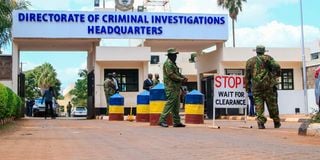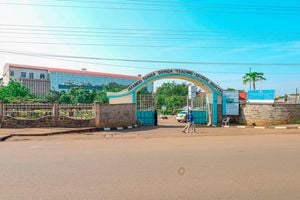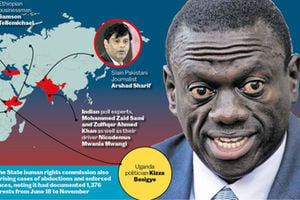
The Directorate of Criminal Investigations (DCI) Headquarters along Kiambu Road.
The investigations into the Kware mass grave, the murder of the head of a private security firm and the slaughter of a family in Eastleigh have one thing in common: the swift arrest of suspects within days of the crimes being made public.
But there hasn't been similar progress in a number of high-profile cases reported to the National Police Service (NPS), including more than 60 deaths and dozens of missing persons documented by the state human rights body in the past five months. Most are victims of the government's brutal crackdown on youth protests that began in June and forced President William Ruto to withdraw the Finance Bill, 2024, which contained a raft of unpopular taxes.
The same detectives have been unable to solve murders, particularly those with political links and suspected state involvement. These investigations have gone cold, leaving families without closure.
The unsolved murders of alleged witnesses in Kenya's International Criminal Court cases, including Meshack Yebei; Kipyegon Kenei, a police officer in the office of Deputy President; Chris Musando, a former official of the Independent Electoral and Boundaries Commission (IEBC); businessman Jacob Juma; university student Mercy Keino; and university lecturer Chrispine Mbai are some of the pending cases.
Some of the murder cases that the officers attached to the Directorate of Criminal Investigations (DCI) have swiftly investigated and made arrests include that of Waris Daud, her 12-year-old daughter Nuseiba Dahir and her niece Amina Abdirashad, 23.
Their brutal murder led to the arrest of Mr Hashim Dagane Muhumed just 10 days after he went into hiding.
The swift investigation that led to the arrest of Mr Muhumed, a former Ethiopian police officer, also opened up another murder case in which he is accused of killing Deka Abdinoor Goron, whose bones were found in Lang'ata cemetery.
Mr Muhumed was linked to Goron's death just three days after he was arrested.
Officers working under DCI Mohamed Amin even managed to get pictures of the suspect carrying two bags containing the remains of the deceased, which he had allegedly cut into pieces.
Another case that the Kenyan officers managed to crack within days was the murder of Wells Fargo Human Resources (HR) manager Willis Ayieko.
One of the suspects, identified as Victor Ouma Okoth, was taken from his hideout in the Dandora area of Nairobi County, where he had rented a house. Two other suspects were shot dead during the investigation.
Another case where DCI officers managed to nab a suspect, who later fled Muthangari Police Station in what Deputy Inspector Gilbert Masengeli described as an inside job, is the murder of 42 women whose bodies were found dumped in Kware area, Nairobi County.
The suspect, identified as Collins Jumaisi Khalusha, managed to sneak out of Muthangari police cells and the DCI is still seeking information that could lead to his arrest.
Jumaisi confessed to ending the women's lives and the case was still in court when he managed to sneak out of the cells along with other foreigners arrested for being in the country illegally.
Most of the unsolved murders this year took place during the Gen-Z protests that rocked the country as Kenyans openly opposed the Finance Bill that would see an increase in taxes.
Those killed include George Njuguna, Frankline Ondwari, Edward Munene, Denzel Omondi, Tony Paul and Samuel Ngure.
The bodies of the deceased were found in several morgues and were marked as unknown.
Speaking to the Nation, David Karani, a human rights defender working under the umbrella of the Kenya National Commission on Human Rights (KNCHR), said the unsolved murders were numerous and causing stress to many families.
“This year, Kenya has seen an alarming rise in unresolved deaths and families across the country are grappling with unimaginable stress, not knowing the fate of their loved ones,” Mr Karani said.
In a recent report released on November 20, the commission said that over 60 people had died in the last five months.
The rights agency, through its vice chairperson Raymond Nyeris, also said that 26 people remain missing after a series of arrests that took place during the anti-Finance Bill protests.
“These police abductions and killings are taking the country back to its dark days,” he said.
He added that the commission had received 74 cases of enforced disappearances in the past five months.
Other cases that have attracted public attention in the past but remain unresolved include that of Tob Cohen, a Dutch national who was killed and his body dumped in a septic tank on his property in 2018.
His widow, Sarah Wairimu, who was considered the prime suspect, was released by the courts. The court allowed the Director of Public Prosecutions (DPP) to withdraw the case.











